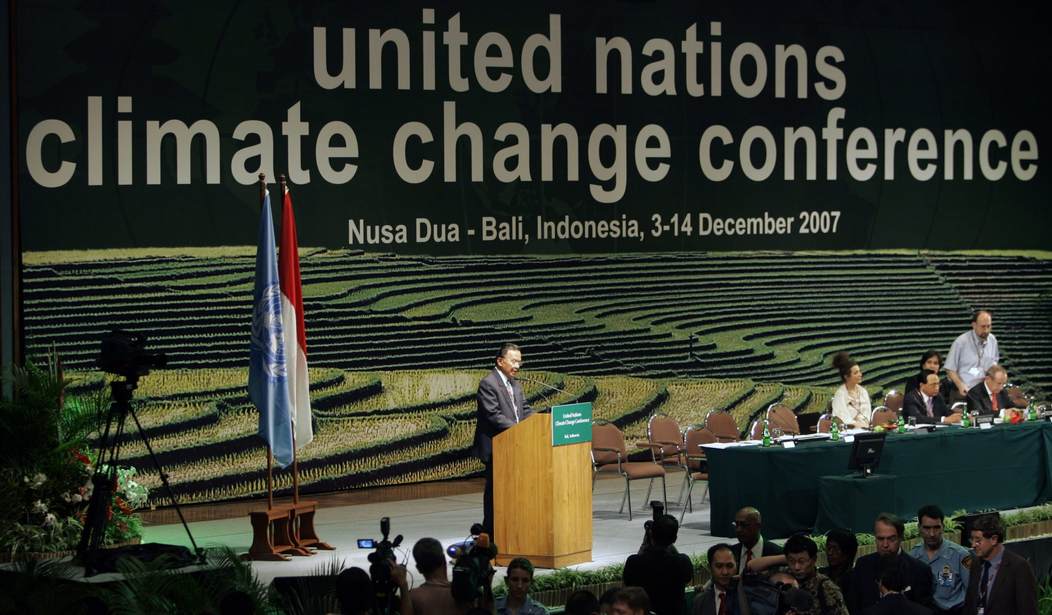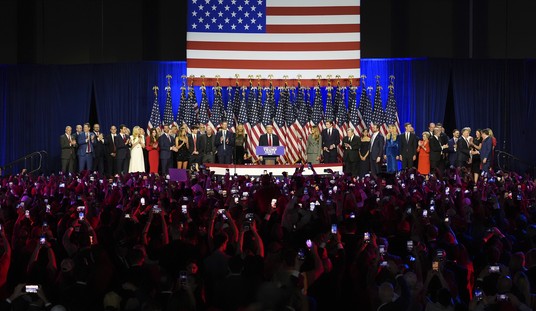For most of recorded human history men have dealt with the weather in two ways: adaptation and amelioration. When sea levels rose, men moved cities inland. But for the first time, policy makers don’t want to adapt to climate, they want to change the climate itself. Perhaps no one put it more clearly than Barack Obama in his 2008 nomination speech. Now the seas would fall. Describing the significance of his vision Obama said, “this was the moment when the rise of the oceans began to slow and our planet began to heal.”
The current program put forward by climate change advocates is frankly one of weather engineering. Policy makers are going to change the quantity of carbon in the atmosphere by taxing energy consumption — and thereby reduce carbon. “A carbon tax is a tax levied on the carbon content of fuels…. From an economic perspective, carbon taxes are a type of Pigovian tax [intended to correct an inefficient market outcome … by being set equal to the social cost of the negative externalities]”
That’s how we’re going to save the world, through Pigovian taxes.
In general governments and big companies (which benefit from government largesse) like Pigovian taxes. The New Yorker writes “a relatively modest carbon tax could cut the projected federal deficit in half. Such a tax would be imposed not just on gasoline but on all fossil fuels—from the coal used to generate electricity to the diesel used to run tractors—so it would affect the price of nearly everything, including food and manufactured goods.”
From the climate change viewpoint making things expensive is excellent because the general idea is to reduce humanity’s footprint on the earth. Jean-Marc Jancovici who actually helped develop the carbon accounting method frankly admits that effective carbon taxation will probably result in less of everything. It will come to less economic growth, smaller houses, less wasteful transportation. In fairness Jancovici “eats little meat, uses public transport, has no cellphone and avoids air travel whenever possible.” He is sincerely willing to put his money where his mouth is.
Not everyone however is so inclined. Harvard economist Greg Mankiw points out the obvious: the public hates Pigovian taxes. “In a democracy, of course, economic policy is set not by economists but by the general public.” That probably explains why the Paris Climate accord was never submitted to the US Senate for ratification but was instead approved by Barack Obama’s executive order.
The moral hazard is obvious. Government likes higher taxes. Cui bono suggests the composition of the We Are Still in Climate Alliance.
“When Trump announced the United States’ exit from the Paris Agreement, several states, cities and businesses came out against the decision. The leaders of California, New York, Virginia, North Carolina, Hawaii, Oregon, Washington, Rhode Island and Connecticut joined corporate giants such as the Intel Corp., Walmart, Google, Amazon and the Microsoft Corp. in affirming their continued commitment to the accord. Together, they formed the We Are Still In alliance, which accounts for an estimated $6.2 trillion in the U.S. economy. Gov. Jerry Brown of California and New York City Mayor Michael Bloomberg, meanwhile, teamed up to create America’s Pledge, a project aimed at tracking local and industrial efforts to reduce carbon dioxide emissions and quantifying their effects.”
But taxing energy does more than just reduce consumption. It reduces the amount of energy actually available to public to react and respond to climate events. You can’t tax energy without it resulting in less of it. That means among other things, less boats. The Cajun Navy would be smaller, if it existed at all. Gas would be more expensive and more scarce. People would be more dependent on public transportation for evacuation, have less food — even canned goods — in their emergency cupboards and so on. And if disaster strikes they’d have to escape flood waters in electric cars.
The Climate Change engineers will counter that the disasters will be prevented or strike less frequently because the seas will fall according to predictions. You won’t have to flee. You won’t have to be rescued. But that’s still a big “if” unless you consider the “science is settled”. There’s some doubt about that. The Geophysical Fluid Dynamics Laboratory of the NOAA summarized the state of knowledge about global warming and hurricanes on Aug 30, 2017.
In summary, neither our model projections for the 21st century nor our analyses of trends in Atlantic hurricane and tropical storm counts over the past 120+ yr support the notion that greenhouse gas-induced warming leads to large increases in either tropical storm or overall hurricane numbers in the Atlantic. One modeling study projects a large (~100%) increase in Atlantic category 4-5 hurricanes over the 21st century, but we estimate that this increase may not be detectable until the latter half of the century.
Therefore, we conclude that despite statistical correlations between SST and Atlantic hurricane activity in recent decades, it is premature to conclude that human activity–and particularly greenhouse warming–has already caused a detectable change in Atlantic hurricane activity. (“Detectable” here means the change is large enough to be distinguishable from the variability due to natural causes.) However, human activity may have already caused some some changes that are not yet detectable due to the small magnitude of the changes or observation limitations, or are not yet confidently modeled (e.g., aerosol effects on regional climate).
Despite these caveats the Climate Change advocates feel that the decisive moment has come to tax the Design Margin and effectively trade the maneuvering energy of an entire global civilization in favor of pre-calculated collision avoidance. That will be good if it works. But it will leave everyone poorer, with less disposable energy and more vulnerable to electric distribution disruptions (like EMP attack “Black Sky” events) than before.
Could those disruptions happen? They are not impossible. In 2016 the entire South Australian power grid, which had shifted a large part of its generating capacity to “renewables” collapsed after storms brought down powerlines. They happened again in December 2016 and again February 2017. There was insufficient surge capacity to deal with the crisis.
A number of politicians commented whilst the emergency was unfolding. The Australian Deputy Prime Minister Barnaby Joyce told ABC “[Windpower] wasn’t working too well last night, because they had a blackout”, while the Prime Minister Malcolm Turnbull said state governments had paid “little or no attention to energy security.”
Energy minister Josh Frydenberg said that “energy security was the (federal) government’s “number one priority”. He later said “it has to be underlined that this was a major weather event.”
South Australian senator Nick Xenophon said he supported renewable energy but that the state’s approach relied too much on wind. South Australian Premier Jay Weatherill said Xenophon had “jumped the shark” as the situation was yet to be analysed.
Queensland One Nation senator, Malcolm Roberts urged all governments to “exit all climate change policies” while South Australian Greens senator Sarah Hanson-Young said it was “pathetic” that people were politicking while emergency service officers and volunteers are flat out responding.
One suggested solution to the South Australian problem was to enact a carbon tax so that investors can build gas plants with predictable profit margins to shore up the renewables. Ironically, one of the factors blamed for the collapse was the effect of “extreme weather” on the deliberately fragile grid. Climate engineering may expose us to far greater risks than it sought to avoid.
Therein lies the danger of shutting down debate and denouncing those who object to a global Pigovian tax as superstitious climate deniers. The deniers are nothing but advocates of the traditional coping strategies.
For centuries civilization has dealt with natural calamities by increasing the availability of cheap energy. Famines, floods and disease used to kill millions. Now energy moves grain ships to areas of crop failure, fuels worldwide distribution systems, powers global communications networks, air travel, enables medicine.
We are about to reverse that trend deliberately, confidently and proudly by imposing trillions of dollars in Pigovian taxes largely upon the poor. Yet it’s not clear that transitioning to a world where everyone “eats little meat, uses public transport, has no cellphone and avoids air travel whenever possible” is really safer than the one it replaces. It all depends on whether you believe the AGW model. But the way things look we’ll do it anyway.
Follow Wretchard on Twitter
For a list of books most frequently purchased by readers, visit my homepage.
Support the Belmont Club by purchasing from Amazon through the links below.
Books:
The Price of Admiralty: The Evolution of Naval Warfare from Trafalgar to Midway, In this book, leading military historian John Keegan illuminates the history of naval combat by expertly dissecting four landmark sea battles, each featuring a different type of warship: the Battle of Trafalgar, the Battle of Jutland in World War I, the Battle of Midway in World War II, and the long and arduous Battle of the Atlantic.
The Genius of Birds, by Jennifer Ackerman. According to revolutionary new research, some birds rival primates and even humans in their remarkable forms of intelligence. Ackerman travels around the world to the most cutting-edge frontiers of research – in Barbados and New Caledonia, the bowerbird habitats of Australia, the ravaged mid-Atlantic coast after Hurricane Sandy and the warming mountains of central Virginia and the western states – and delves deeply into the latest findings about the bird brain itself that are shifting our view of what it means to be intelligent.
The Unwinding: An Inner History of the New America, by George Packer. Using a novelistic approach, Packer tells the story of the past three decades by journeying through the lives of several Americans, including a son of tobacco farmers who becomes an evangelist for a new economy in the rural South, a factory worker in the Rust Belt trying to survive the collapse of her city, a Washington insider oscillating between political idealism and the lure of organized money, and a Silicon Valley billionaire who arrives at a radical vision of the future. He interweaves these stories with sketches of public figures and collages made from newspaper headlines, advertising slogans, and song lyrics. Winner of the 2013 National Book Award.
For a list of books most frequently purchased by readers, visit my homepage.
Did you know that you can purchase some of these books and pamphlets by Richard Fernandez and share them with your friends? They will receive a link in their email and it will automatically give them access to a Kindle reader on their smartphone, computer or even as a web-readable document.
The War of the Words, Understanding the crisis of the early 21st century in terms of information corruption in the financial, security and political spheres
Rebranding Christianity, or why the truth shall make you free
The Three Conjectures, reflections on terrorism and the nuclear age
Storming the Castle, why government should get small
No Way In at Amazon Kindle. Fiction. A flight into peril, flashbacks to underground action.
Storm Over the South China Sea, how China is restarting history in the Pacific
Tip Jar or Subscribe or Unsubscribe to the Belmont Club










Join the conversation as a VIP Member